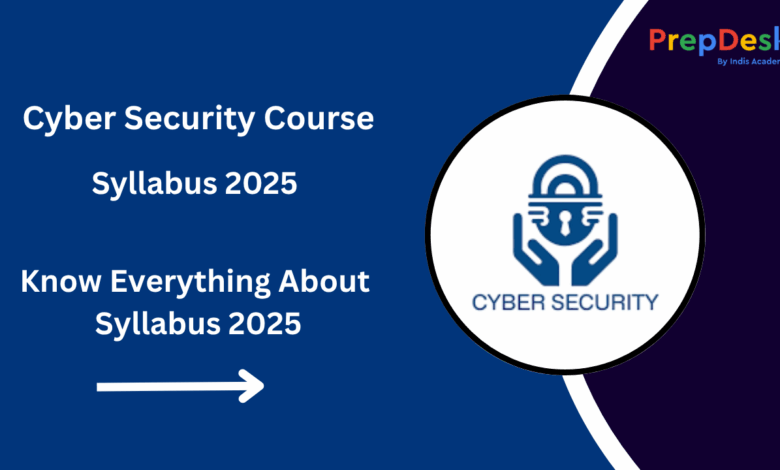Cyber Security Course Syllabus 2025 | Comprehensive Guide & Download PDF
Explore the complete Cyber Security Course Syllabus 2025 covering B.Tech, B.Sc, Diploma, and Certification programs. Get semester-wise subject details, topics with descriptions, marks distribution, PDF syllabus download, recommended books, preparation tips, and specializations.

Cybersecurity is no longer a luxury; it’s a necessity. With rising cyber threats, every industry today demands trained cybersecurity professionals. If you’re aiming to become one, understanding the complete Cyber Security course syllabus is your first step.
This guide covers all major courses in cybersecurity, including:
- B.Tech in Cyber Security
- B.Sc in Cyber Security
- Diploma in Cyber Security
- Cyber Security Certification Courses (Short-term/Professional)
You’ll get the full breakdown of each program’s duration, eligibility, semester-wise syllabus, subjects, marks, syllabus PDF download link, recommended books, preparation tips, and specializations – fully SEO-optimized and formatted for WordPress.
Cyber Security refers to the practice of protecting computers, networks, mobile devices, and data from unauthorized access or malicious attacks. Professionals in this domain ensure data integrity, confidentiality, and availability, using a mix of software, hardware, policies, and ethical practices.
Cyber Security Course Overview (All Types)
| Course Type | Duration | Eligibility | Career Level |
|---|---|---|---|
| B.Tech in Cyber Security | 4 Years (8 Semesters) | 10+2 with PCM (minimum 50%) | Undergraduate Degree |
| B.Sc in Cyber Security | 3 Years (6 Semesters) | 10+2 with any stream | Undergraduate Degree |
| Diploma in Cyber Security | 1–3 Years | 10th or 12th pass (depends on institute) | Technical/Vocational |
| Certification Courses | 3 to 12 Months | Basic computer knowledge | Professional / Short-Term Skill |
1. B.Tech in Cyber Security Syllabus (Full Semester-wise)
Semester 1 – Foundation
- Fundamentals of Computing
- Introduction to Programming in C
- Digital Electronics
- Mathematics I
- Communication Skills
Semester 2 – Basics of IT & Networks
- Data Structures
- Operating Systems
- Computer Networks (TCP/IP, OSI)
- Database Management Systems (SQL, RDBMS)
- Mathematics II (Statistics, Probability)
- Environmental Studies
Semester 3 – Cyber Security Foundations
- Introduction to Cyber Security
- Information Security Principles
- Cryptography I (AES, DES, Hashing)
- Web Technologies (HTML, CSS, JS)
- Linux Operating System
Semester 4 – Security Essentials
- Network Security (Firewalls, IDS/IPS)
- Ethical Hacking I (Recon, Footprinting, Kali Linux)
- Cryptography II (Public Key, RSA, ECC)
- Secure Programming Practices
- Cloud Fundamentals & Virtualization
Semester 5 – Applied Cyber Defense
- Mobile & Wireless Security (GSM, Wi-Fi)
- Malware Analysis (Static, Dynamic)
- Cyber Law & Digital Ethics (IT Act, GDPR)
- Penetration Testing (Tools: Nmap, Metasploit)
- Mini Project (Pen Test Simulation or Security Audit)
Semester 6 – Tools & Operations
- Security Operations Center (SOC)
- Incident Response & Handling
- SIEM Tools (Splunk, AlienVault)
- AI in Cyber Security
- Blockchain & Cyber Security
- Industrial Internship
Semester 7 – Industry & Specialization
- Cyber Forensics (Disk Imaging, Chain of Custody)
- Internet of Things (IoT) Security
- Elective I (Choose from Cloud Security / AppSec / Privacy Engineering)
- Project Work – Phase I (Problem Definition & Tools)
Semester 8 – Final Evaluation
- DevSecOps (CI/CD Security, Container Security)
- Elective II (Choose from Risk Assessment / Red Teaming / Cloud Forensics)
- Final Project / Dissertation
- Seminar + Comprehensive Viva
Marks Distribution (B.Tech)
| Evaluation Component | Weightage |
|---|---|
| Internal Assessment (Assignments, Quizzes) | 20% |
| Laboratory & Practical Exams | 30% |
| Theory Exams (End-Semester) | 40% |
| Project Work & Internship | 10% |
2. B.Sc in Cyber Security Syllabus (Full Semester-wise)
Semester 1 – Computer & Security Basics
- Introduction to Cyber Security
- Computer Fundamentals
- Programming in Python
- Networking Concepts (LAN, WAN, Protocols)
Semester 2 – OS, Web & Data
- Operating Systems
- Web Application Security (OWASP Top 10)
- Cryptography Basics
- Data Communication & Transmission
Semester 3 – Hacking & InfoSec
- Ethical Hacking Techniques
- Information Security Management
- Cyber Laws & Cyber Crimes
- Database Security
Semester 4 – IoT & Cloud Security
- IoT Architecture & Vulnerabilities
- Cloud Security (AWS, Azure)
- Penetration Testing Lab
- Linux Admin for Security
Semester 5 – Forensics & Secure Coding
- Digital Forensics Tools & Procedures
- Secure Software Development Lifecycle (SSDLC)
- Project Work I
- Mini Internships / Guest Lectures
Semester 6 – AI Security + Project
- Machine Learning in Security
- Threat Intelligence & Detection
- Major Project (Research / Case Study)
- Final Presentation & Viva
B.Sc Cyber Security – Marks Structure
| Assessment | Weight |
|---|---|
| Internal Exams & Assignments | 25% |
| Lab Practical | 25% |
| Theory Semester Exams | 40% |
| Project + Seminar | 10% |
3. Diploma in Cyber Security Syllabus (Module-wise)
Overview
- Duration: 1 to 3 Years
- Eligibility: 10th or 12th pass
- Mode: Regular / Online / Weekend
Core Modules
| Module | Topics Covered | Description |
|---|---|---|
| Module 1 | IT Fundamentals | Basics of computers, internet, OS, file systems |
| Module 2 | Networking Concepts | Topologies, TCP/IP, routers, switches, IP classes |
| Module 3 | Information Security | CIA triad, access control, firewalls, antivirus |
| Module 4 | Cryptography | Encryption/Decryption, hashing, key exchange |
| Module 5 | Ethical Hacking Basics | Footprinting, scanning, social engineering |
| Module 6 | Tools & Projects | Use of Kali Linux, Wireshark, Nmap, Burp Suite; mini-project |
4. Cyber Security Certification Courses
Certification courses are ideal for professionals, job seekers, or students who want to enhance their cybersecurity skills quickly. These are short-term, hands-on, and globally recognized.
Top Cyber Security Certifications
| Certification | Provider | Focus Area | Duration |
|---|---|---|---|
| CEH – Certified Ethical Hacker | EC-Council | Ethical hacking tools, Kali Linux | 4–6 Months |
| CompTIA Security+ | CompTIA | Network, compliance, access management | 3–4 Months |
| CISSP | ISC2 | Security strategy, management | 6–9 Months |
| OSCP | Offensive Security | Advanced Pen Testing | 6 Months |
| Google Cybersecurity Certificate | Google/Coursera | Intro to Cybersecurity, tools | 3–6 Months |
| Certified SOC Analyst | EC-Council | Security operations, threat monitoring | 2–3 Months |
Certification Syllabus Topics
- Vulnerability Assessment
- Malware Analysis & Handling
- Threat Intelligence & Hunting
- Red Team / Blue Team Simulations
- SIEM Tools – Splunk, QRadar
- Incident Reporting & Response
Download Cyber Security Syllabus PDF
Want to study offline? Download the complete syllabus for B.Tech, B.Sc, Diploma, and Certification courses in PDF format.
Click Here to Download Cyber Security Syllabus PDF
Recommended Books for Cyber Security
| Book Title | Author |
|---|---|
| Cybersecurity Essentials | Charles J. Brooks |
| Hacking: The Art of Exploitation | Jon Erickson |
| Cryptography and Network Security | William Stallings |
| The Web Application Hacker’s Handbook | Dafydd Stuttard, Marcus Pinto |
| Practical Malware Analysis | Michael Sikorski, Andrew Honig |
| Computer Security: Principles and Practice | William Stallings & Lawrie Brown |
Cyber Security Preparation Strategy
- Master the Fundamentals: Start with networking, operating systems, and basic programming.
- Practice Tools Daily: Use platforms like TryHackMe, Hack The Box.
- Learn Offensive & Defensive Techniques: Understand penetration testing as well as SIEM monitoring.
- Follow Threat Reports: Stay updated via blogs like KrebsOnSecurity, ThreatPost, Cyware, and SANS.
- Take Certifications: Add value to your resume with globally accepted credentials.
- Do Projects: Simulate attacks, secure an application, or conduct forensic analysis.
- Join Cyber Communities: Engage on Reddit (r/cybersecurity), Discord, and LinkedIn groups.
Cyber Security Specializations
| Specialization | Career Opportunities |
|---|---|
| Ethical Hacking | Penetration Tester, Bug Bounty Hunter, Security Consultant |
| Cyber Forensics | Digital Forensics Analyst, Law Enforcement Investigator |
| SOC & Threat Intelligence | SOC Analyst, Threat Intelligence Analyst |
| Cloud Security | Cloud Security Engineer, DevSecOps Expert |
| Application Security | Secure Code Analyst, AppSec Specialist |
| AI & ML in Security | AI Cybersecurity Analyst, Threat Detection Engineer |
Conclusion
The demand for skilled cybersecurity professionals is rising exponentially. With evolving threats like ransomware, phishing, deepfakes, and cloud vulnerabilities, the industry needs defenders who are trained, certified, and up-to-date.
Whether you’re pursuing a full-fledged degree like B.Tech or B.Sc, opting for a Diploma, or upgrading through Certification Courses, mastering the cyber security syllabus outlined here will prepare you for real-world challenges.
This guide not only gives you a clear academic roadmap but also integrates practical strategies, tools, and books to make you truly industry-ready.
Start your journey in cyber defense today — and be the digital shield of tomorrow!





